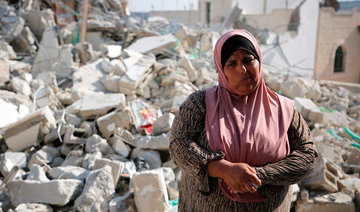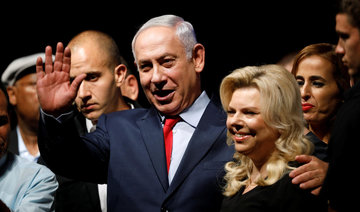AMMAN: The internal Palestinian conflict and the larger Arab-Israeli conflict are taking their toll on journalism in Palestine.
Palestinian journalists and the public’s right to know seem to be the biggest victims in a campaign that has included arrests by both West Bank and Gaza security agencies, the blocking of websites, and the issuance of a presidential decree that criminalizes posts on social media and online content. Israeli troops have also raided Palestinian media outlets and confiscated equipment.
The Palestinian Center for Development and Media Freedoms (MADA) on Wednesday condemned the arrest by Palestinian security services in the West Bank of five journalists: Ahmad Mohammed Halayka, Tareq Abu Zeyd, Quttaiba Saleh Qasem, Mamdouh Mahmoud Hamamreh and Amer Abdul Hakim Abu Arafeh.
Muntaser Hamdan, a member of the Palestinian Journalists Syndicate (PJS), said what is happening to journalists is a premeditated campaign by both Hamas and Fatah.
“This unprecedented campaign is having a negative effect on all professional journalists and media outlets,” he told Arab News.
The only way to face up to “police-like repression” is unity among journalists and their close adherence to professional standards, Hamdan added.
The PJS on Thursday called on its members not to publish any news connected to Palestinian security apparatuses or the attorney general’s office.
The syndicate, which is closely aligned to the ruling Fatah party, said the attorney general’s office broke a promise not to use a controversial cybersecurity law for issues connected to freedom of expression.
Palestinian courts in Ramallah, Hebron and Bethlehem used the recently signed law to justify extending the journalists’ detention.
Ammar Dweik, head of the government-appointed Palestinian Independent Commission for Human Rights, called the law “one of the worst” since the Palestinian Authority (PA) was established in 1994.
The vaguely-worded law makes it a crime for any Palestinian to publish content that harms “national unity” or the “social fabric.” It is “a big setback for freedoms in the West Bank,” said Dweik.
Families of the five journalists, who work for media outlets close to Hamas, have announced a protest march on Saturday from Ramallah’s Manara Square to the presidential headquarters.
Hamas security forces in Gaza have also arrested journalists, including Fouad Jaradeh, a reporter with the official Palestine TV.
The New York-based Committee to Protect Journalists (CPJ) called on Hamas to release him.
“Fouad Jaradeh’s arrest illustrates the pressure that Palestinian journalists face from all sides,” CPJ Middle East and North Africa Program coordinator Sherif Mansour said.
“Hamas authorities should release Fouad Jaradeh immediately and should not deny Palestinians in the West Bank the right to receive news from Gaza.”
In July, the PA blocked 30 websites, including many owned or reflecting the views of Hamas and renegade Fatah leader Mohammed Dahlan.
Journalists working for Arab and international media are also harassed by Israel’s army. The Jerusalem Post reported that troops on July 28 raided media offices in Ramallah, confiscating equipment and documents.
The Israeli newspaper quoted an army spokesman as saying the offices are “suspected of manufacturing and distributing material which incites terrorism.”
The official Palestinian news agency WAFA said Israeli troops raided the offices of Palmedia, a member of the Palestinian telecommunications group that provides broadcast services to media outlets such as Russia Today (RT), Al-Mayadeen, Al-Manar and Al-Quds News. According to the Palestinian Maan News Agency, nothing was confiscated from RT’s offices.
Palestinian journalists targeted by all sides
Palestinian journalists targeted by all sides

Palestinian citizens in Israel demand more security from violence

- Protests and strikes are sweeping Israel over record levels of violence targeting the country’s Palestinian citizens
- At least 26 people were killed in January alone, adding to a record-breaking toll of more than 250 last year
KAFR YASIF, Israel: Nabil Safiya had taken a break from studying for a biology exam to meet a cousin at a pizza parlor when a gunman on a motorcycle rode past and fired, killing the 15-year-old as he sat in a black Renault.
The shooting — which police later said was a case of mistaken identity — stunned his hometown of Kafr Yasif, long besieged, like many Palestinian towns in Israel, by a wave of gang violence and family feuds.
“There is no set time for the gunfire anymore,” said Nabil’s father, Ashraf Safiya. “They can kill you in school, they can kill you in the street, they can kill you in the football stadium.”
The violence plaguing Israel’s Arab minority has become an inescapable part of daily life. Activists have long accused authorities of failing to address the issue and say that sense has deepened under Israel’s current far-right government.
One out of every five citizens in Israel is Palestinian. The rate of crime-related killings among them is more than 22 times higher than that for Jewish Israelis, while arrest and indictment rates for those crimes are far lower. Critics cite the disparities as evidence of entrenched discrimination and neglect.
A growing number of demonstrations are sweeping Israel. Thousands marched in Tel Aviv late Saturday to demand action, while Arab communities have gone on strike, closing shops and schools.
In November, after Nabil was gunned down, residents marched through the streets, students boycotted their classes and the Safiya family turned their home into a shrine with pictures and posters of Nabil.
The outrage had as much to do with what happened as with how often it keeps happening.
“There’s a law for the Jewish society and a different law for Palestinian society,” Ghassan Munayyer, a political activist from Lod, a mixed city with a large Palestinian population, said at a recent protest.
An epidemic of violence
Some Palestinian citizens have reached the highest echelons of business and politics in Israel. Yet many feel forsaken by authorities, with their communities marked by underinvestment and high unemployment that fuels frustration and distrust toward the state.
Nabil was one of a record 252 Palestinian citizens to be killed in Israel last year, according to data from Abraham Initiatives, an Israeli nongovernmental organization that promotes coexistence and safer communities. The toll continues to climb, with at least 26 additional crime-related killings in January.
Walid Haddad, a criminologist who teaches at Ono Academic College and who previously worked in Israel’s national security ministry, said that organized crime thrives off weapons trafficking and loan‑sharking in places where people lack access to credit. Gangs also extort residents and business owners for “protection,” he said.
Based on interviews with gang members in prisons and courts, he said they can earn anywhere from thousands to hundreds of thousands of dollars, depending on whether the job is torching cars, shooting at buildings or assassinating rival leaders.
“If they fire at homes or people once or twice a month, they can buy cars, go on trips. It’s easy money,” Haddad said, noting a widespread sense of impunity.
The violence has stifled the rhythm of life in many Palestinian communities. In Kafr Yasif, a northern Israel town of 10,000, streets empty by nightfall, and it’s not uncommon for those trying to sleep to hear gunshots ringing through their neighborhoods.
Prosecutions lag
Last year, only 8 percent of killings of Palestinian citizens led to charges filed against suspects, compared with 55 percent in Jewish communities, according to Abraham Initiatives.
Lama Yassin, the Abraham Initiatives’ director of shared cities and regions, said strained relations with police long discouraged Palestinian citizens from calling for new police stations or more police officers in their communities.
Not anymore.
“In recent years, because people are so depressed and feel like they’re not able to practice day-to-day life ... Arabs are saying, ‘Do whatever it takes, even if it means more police in our towns,’” Yassin said.
The killings have become a rallying cry for Palestinian-led political parties after successive governments pledged to curb the bloodshed with little results. Politicians and activists see the spate of violence as a reflection of selective enforcement and police apathy.
“We’ve been talking about this for 10 years,” said Knesset member Aida Touma-Suleiman.
She labeled policing in Palestinian communities “collective punishment,” noting that when Jews are victims of violence, police often set up roadblocks in neighboring Palestinian towns, flood areas with officers and arrest suspects en masse.
“The only side that can be able to smash a mafia is the state and the state is doing nothing except letting (organized crime) understand that they are free to do whatever they want,” Touma-Suleiman said.
Many communities feel impunity has gotten worse, she added, under National Security Minister Itamar Ben-Gvir, who with authority over the police has launched aggressive and visible campaigns against other crimes, targeting protests and pushing for tougher operations in east Jerusalem and the occupied West Bank.
Israeli police reject allegations of skewed priorities, saying that killings in these communities are a top priority. Police also have said investigations are challenging because witnesses don’t always cooperate.
“Investigative decisions are guided by evidence, operational considerations, and due process, not by indifference or lack of prioritization,” police said in a statement.
Unanswered demands
In Kafr Yasif, Ashraf Safiya vowed his son wouldn’t become just another statistic.
He had just gotten home from his work as a dentist and off the phone with Nabil when he learned about the shooting. He raced to the scene to find the car window shattered as Nabil was being rushed to the hospital. Doctors there pronounced him dead.
“The idea was that the blood of this boy would not be wasted,” Safiya said of protests he helped organize. “If people stop caring about these cases, we’re going to just have another case and another case.”
Authorities said last month they were preparing to file an indictment against a 23-year-old arrested in a neighboring town in connection with the shooting. They said the intended target was a relative, referring to the cousin with Nabil that night.
And they described Nabil as a victim of what they called “blood feuds within Arab society.”
At a late January demonstration in Kafr Yasif, marchers carried portraits of Nabil and Nidal Mosaedah, another local boy killed in the violence. Police broke up the protest, saying it lasted longer than authorized, and arrested its leaders, including the former head of the town council.
The show of force, residents said, may have quashed one protest, but did nothing to halt the killings.














